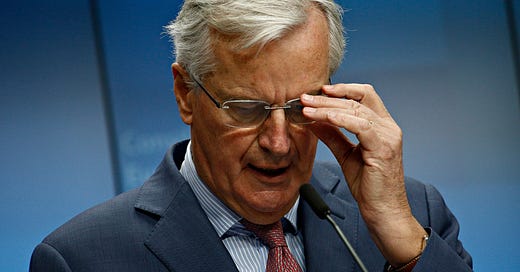
French debt risks triggering a Eurozone financial meltdown
Markets have decided that France in 2024 is looking a bit like Greece in 2010
On Wednesday, investors in French government bonds strapped on their running shoes. At the close of business, at 3.02%, French sovereign debt was trading at the exact same level as that of Greece. Repeat, French 10 year debt was level with that of Greece.
Since the snap elections called by President Macron in the summer in the aftermath of the dramatic polarisation of the popular vote in the May elections to the European parliament which then delivered an even greater split towards on one hand Jean-Luc Mélenchon’s “hard left” and on the other Marine Le Pen’s “hard right” France has not only looked but has in fact been ungovernable. Macron looked politically like that famous polar bear stranded on an icefloe drifting south. Having refused to ask Mélenchon, de facto leader of the rag-tag left and centre left alliance which was now the largest bloc in the Assemblée Nationale to try to form a minority government he after some time turned to the domestically virtually unknown political and administrative veteran Michel Barnier to try to do the same, albeit beginning at the right of centre. France has not gone from bad to worse but from worse to even worse.
I spent eight very happy albeit not particularly well paid years working for BNP, the Banque Nationale de Paris. I was there through the 1993 privatisation and somewhere in a nominee account in Paris I think I still own a very small number of deeply discounted shares that had been on offer to staff. I was also there in 1999 when BNP acquired France’s leading investment bank Paribas, and it was during the integration that I along with more or less anybody who was in the acquiring bank’s fixed income division was shown the red card. I was one of only a few – less than a handful – of Brits who was entirely fluent in French and thus I had unusual access to the machinery that made French banks work the way they did and by all accounts in many respects still do. Thus I was drawn into the team that was tasked with introducing French index linked bonds to the market and met with a number of officials of the Trésor – never the really senior ones – where I learnt of their extraordinary sense of French superiority. In markets it is always better to believe that you are the geezer.
This was also the era of the introduction of the euro as the new single currency. Conditions for entry had been laid down in the Maastricht Treaty and were for members to run a deficit-to-GDP ratio of no more than a 3% and a debt level of no more than 60% of GDP. When the criteria were first published France was running a deficit of between 5% and 6%. The government then came up with “5-4-3” which determined that over the coming three years it would get to 3%, come what may.
I had long arguments with my French economist Cyril Beuzit, at last count teaching at Paris Dauphine, in which I insisted that that reduction in the deficit could never be achieved. I guess his faith in INSEE, the national statistical office, and its ability to deliver the numbers was greater than mine was in the government to achieve them. France met the Maastricht criteria and despite Italy remaining a country mile away it too was taken on board. Cyril had always argued that the political will would triumph whilst I had maintained that politics could never defeat economics. For a quarter of a century he has been right, and I have been wrong.
When the euro was first introduced and when all government bond markets were redenominated in the same currency Paris was competing, or at least thought it was competing, for French OATs, to be given benchmark status ahead of German Bunds due to the country’s more sophisticated and therefore more liquid bond market. France believed itself to be no less than an equal in the EU hierarchy, which it saw as a duopoly. France was the moral arbiter, Germany paid the bills. French bonds always traded close to German ones but never quite close enough to be seen as equal.
To this day every sovereign bond denominated in the euro is not looked at for its nominal yield but simply by the spread at which it trades cheap to Bunds. So 3.01% means nothing in the greater scheme. What it tells is that the French 10 year is currently not priced just a few but 86 basis points higher than German Bunds, which are at 2.16%. Dutch bonds, always regarded as the Bund’s little brothers are at 2.40% and even Spanish Bonos are “only” ay 2.89%. France is trading flat to Greece, for most of the past decade and a half a fiscal basket case although Italy at 3.41% remains a story unto itself and the elephant in every one of the eurozone’s rooms.
So, at the turn of the century French debt to GDP was below 60% and if without INSEE’s statisticians to hand it wasn’t it was certainly very close. As at the end of 2023 it was 110%, down from 114% during the Covid crisis. That is due to post-Covid lockdowns GDP being higher, not because debt has fallen. The case is clear: France has for decades been living way above its means despite the above-average tax burden on all parts of society and the economy and INSEE can no longer fix the leaking bucket.
Macron was not entirely wrong in avoiding a Mélenchon government given the many spending intentions and especially the promise to push the pension age back to 60, expressed by the man even though he has had to violate political conventions in order to do so. Barnier has spelt out the fiscal realities of the country which are to increase taxation even further while cutting public services that cannot and, in many cases, never could be afforded. He has no working majority in the Assemblée and if his government falls he has warned that France is headed for the abyss.
Greece was not that long ago regarded as the fiscal black hole of all black holes and without some very significant support from Berlin it would in 2010 have crashed out of the euro. The Greek financial crisis is a textbook example of economic mismanagement at government level – they thought that if they had the same currency as Germany they could live to the same standard – which manifested itself by way of unsustainable debt levels, excessive public spending, high wage growth not supported by productivity growth, which led to a decline in Greece’s competitiveness, a surge in credit growth, and massive tax evasion. Markets have decided that France in 2024 is to some extent looking a bit like Greece in 2010 and investors in both bonds and equities are voting, if not with their feet, then with a finger on the “sell” button.
Greece’s recovery has been extraordinary although it has not come for free. Dramatic cuts in government spending have had to be imposed on the Greek people. Pensions were slashed, numerous public services suspended, and the economy has taken a severe pounding. To be fair, the giveaway culture in pre-crisis Greece was epic – famously former workers for the power grid were granted free electricity for life and in the event of their death it was extended to their heirs – and something had to be done. Greece has demonstrated that it can, although the ten or more years of drastic austerity have not been fun. Barnier is in effect warning that unless France too begins to cut its suit to match its cloth it is facing a similar fate and that those who oppose him are whistling in the dark. Few out there believe he will find a parliamentary majority and that the current ungovernability is set to continue.
Meanwhile Elon Musk and Vivek Ramaswamy will be carving their turkey today while contemplating how they are going to take the knife to government cost. Both have made fortunes in the private sector – Musk’s net worth is roughly 140% of Greece’s annual GDP – but this was in the private sector and the public one is a very different kettle of fish. The key word is inertia although Max Weber regarded this as being in many respects its strongest suit. The whole idea of the civil service is that it is rock solid, does not flutter in the breeze of changing government priorities and steadily ploughs its furrow.
One of the key targets will be the US Department of Education which employs 4,000 people and manages a budget of US$ 328 billion. So far, so good except that in the United States education is a matter for the individual states and the federal government has no formal role. The DoE was established in 1979 when it was separated from health and welfare and in the eyes of many Americans, largely but not exclusively those of the Trumpublican persuasion, has grown out of all proportions to its remit.
Musk’s and Ramaswamy’s Department of Government Efficiency has itself no legal status, is not an arm of government and is therefore of no legislative relevance. At best the two billionaires can advise the President. The older you are, the more often you have heard politicians talking of pinning back the state and slashing unproductive parts of the civil service. Greece has done it, and President Milei of Argentina is also on the case. Otherwise, the political powers that be have again and again bitten out their teeth if, as and when they even tried with an emphasis on if. Musk and Ramaswamy have let it be known that they are closely watching Argentina to see what they can learn from Milei’s experience.
At the centre of a 22-point plan submitted to the two by Senator Joni Ernst of Iowa lies the demand that government workers return to a five days a week in the office routine rather than persisting with what she sees as hugely wasteful and inefficient working from home. This will be carefully studied by people in Britain who have been told by ministers in the new government that WFH has increased the performance of our own civil service. Really? I have in front of me a tax form to be stamped, signed and returned which I sent to HMRC dated February 21st which came back to me in the mail this week stamped and dated November 18th. I say no more.















